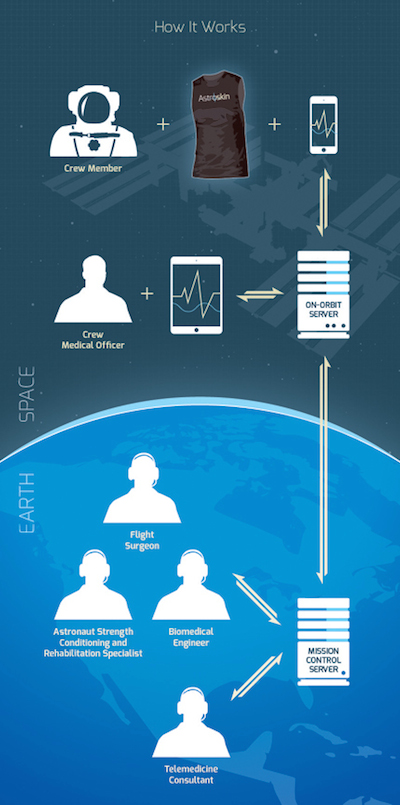 In early February, a group of six, three men and three women, embarked on a 45-day expedition in Antarctica to test Astroskin, a smart shirt prototype developed by Carre Technologies for the Canadian Space Agency (CSA). The CSA also invested $1.12 million in a total of five studies, which they expect to complete in 2014, that explore technologies that aim to make space flight safer for astronauts. One of these studies was testing the Astroskin technology.
In early February, a group of six, three men and three women, embarked on a 45-day expedition in Antarctica to test Astroskin, a smart shirt prototype developed by Carre Technologies for the Canadian Space Agency (CSA). The CSA also invested $1.12 million in a total of five studies, which they expect to complete in 2014, that explore technologies that aim to make space flight safer for astronauts. One of these studies was testing the Astroskin technology.
Astroskin, which is Carre Technologies' second smart shirt, has a few more tracking capabilities than the company's first smart shirt, called Hexoskin. While both shirts measure heart rate, heart rate variability, breathing rate, respiration volume, calories burned, and steps taken per minute, a must-read post from IEEE Spectrum explains, Astroskin also measures skin temperature, has a more sophisticated EKG sensor, and an optical sensor that tracks blood oxygenation and blood pressure.
If the user wears the shirt while they sleep, they are given a “sleep-efficiency score” based on movement, heart rate, and respiration. The shirts have a pocket in which users put a small wireless-enabled device that collects this information and sends it on to a smartphone.
While the explorers on the expedition wore the shirts, a CSA astronaut, David Saint-Jacques, followed their travels from Canada and interacted with them on social media during their mission. Saint-Jacques also wore the Astroskin prototype during his regular exercise routine, so that he could compare and share his data with the crew. Additional testing of the shirt took place at the Universite du Quebec a Montreal (UQAM) to measure Astroskin's accuracy, reliability of data, ease of use, and comfort.
The CSA hopes that, like Hexoskin, the Astroskin shirt could be available for consumers at some point.
"The great thing about this technology is that since it's wireless it can be monitored at a distance," CSA Chief Medical Officer Raffi Kuyumjian said in a video on CSA's website. "It can be used also by patients on earth, people who live in remote communities, for example, who don't have an easy access to a doctor. They can have these shirts on them all the time. It can trigger alarms if something wrong is happening and alert the doctors following them at a distance."
A Hexoskin starter kit that includes a shirt, the data collection device, and a connection cable is available for $399. Users can buy just a shirt for $175. Until this week, users needed the cable to connect the device to a computer to record data. Now, a companion app is available for Android devices.
Another company, OMsignal, is manufacturing clothing embedded with various health sensors that could have a variety of use cases. The shirt captures ECG, activity, breathing patterns and “emotive” states on a continuous basis. It then presents that data to the wearer via an app on their mobile device. While the shirt can track ECG, the app doesn’t show it in that form because OMsignal itself isn’t looking to make the shirt an FDA regulated medical device, but another company, called HealthWatch, is seeking FDA clearance for its ECG shirt. Consumers can preorder the OMsignal device from the company's website for $199. It will eventually retail for $240.

















